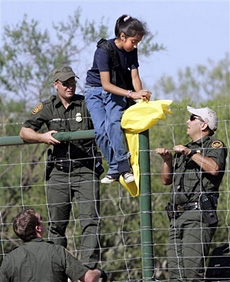 |
 |
 |
 News from Around the Americas | August 2006 News from Around the Americas | August 2006  
Border Agents Make Zero-Tolerance Zone
 Alicia A. Caldwell - Associated Press Alicia A. Caldwell - Associated Press


| | Border Patrol agents help a girl over a ranch fence so she can be taken into custody in South Texas brush country north of Laredo, Texas. A 210-mile stretch of the Texas-Mexico border has been set up as zero-tolerance zone for illegal immigration. Instead of merely getting sent back home, immigrants here are arrested, prosecuted, and sometimes sentenced to prison before they are formally kicked out of the country. (AP/LM Otero) |
It's a way of criminalizing someone who just wants to come here and work. Standing in a cramped federal courtroom last month, illegal immigrant Walter Oscar Portillo-Machado pleaded with a judge for mercy. But he came to the wrong place for that.

The Salvadoran man was caught along a 210-mile stretch of the Texas-Mexico border that has been set up as zero-tolerance zone for illegal immigration. Instead of merely getting sent back home, immigrants here are arrested, prosecuted, and sometimes sentenced to prison before they are formally kicked out of the country.

The effort began late last year along a border area that includes the Rio Grande border towns of Del Rio and Eagle Pass. It has been hailed by federal officials as a creative use of local and federal resources to tighten the border.

While other border sectors avoided strict enforcement because they did not have enough jail space or prosecutors, authorities in the Del Rio area found bed space elsewhere in the region, assigned federal agents to help prosecute cases and began running illegal immigrants through a courtroom at a rate of one case per minute.

Immigration advocates have criticized the practice, saying it only moves the problem elsewhere along the border and may sacrifice civil liberties for the sake of efficiency.

'There's nothing we're doing that wasn't already on the books,' said Hilario Leal Jr., a supervisory Border Patrol agent in the Del Rio sector. 'It's nothing new. We just started enforcing the law.'

The Del Rio sector also ended the widespread practice of 'catch-and-release' that freed most non-Mexican immigrants with a piece of paper ordering them to show up in federal immigration court a month later _ and almost no one did.

Most Mexican citizens with no criminal record who cross outside the Del Rio sector are still escorted back shortly after their arrest. Those from other countries are held in a detention center _ not as criminals serving time _ while the paperwork is being completed to return them to their home countries.

But in the Del Rio sector, every adult illegal immigrant, regardless of their home country, is criminally prosecuted and removed from the country after they have served his sentence.

'They know if they come (to Del Rio) they are going home, they are going to jail,' Leal said.

Before the effort began, illegal immigrants came across the river near Del Rio in droves, with Central and South American citizens often surrendering to agents because they knew they would be let go _ after receiving food, water, medical care and sometimes a ride to a bus station, along with their notice to appear in court.

In recent years, the situation had become so hectic that Del Rio sector agents were lucky if they patrolled the border for two hours during an eight or 10-hour shift, Agent Cynthia Bilyk said. The rest of their time was spent processing the immigrants.

Agents in the sector were averaging about 500 arrests a day, Leal said. Now there are fewer than 100 daily arrests, and the reforms are credited with reducing arrests by about 29 percent so far this fiscal year.

While the changes have curbed arrests, freed up agents and other resources, they have not slowed the traffic at the federal courthouse.

The day Portillo-Machado stood shackled and handcuffed in the courtroom, he was surrounded by more than 30 defendants facing the same charge. The judge handled about one guilty plea a minute.

When his name was called, Portillo-Machado said 'Cupable,' which means guilty in Spanish. He then asked the judge for forgiveness and was later sentenced to 120 days in jail.

Court staff said the day's docket was light in comparison with the average crowd of would-be immigrants that often overflows the courtroom.

Magistrate Judge Dennis Green said the cases are heard quickly, but each defendant meets with a court-appointed lawyer before going to court. If there is any question about an immigrant's potential defense, that person's case is heard separately, the judge said.

The federal court's two Del Rio magistrate judges are hearing about 2,100 cases a month. Their counterparts farther from the border in West Texas are averaging about 140.

Opponents say the process just pushes the problem to other sectors.

'The border is like a balloon,' said El Paso immigration lawyer Felipe D.J. Millan. 'If it expands in one area, guess what? It still comes in from another area.'

Millan also worries that the reforms in the Del Rio sector and a similar plan in southern New Mexico are simply backdoor efforts to criminalize immigrants.

'It's a wasted resource,' Millan said. 'It's a way of criminalizing someone who just wants to come here and work.' | 
 | |
 |



